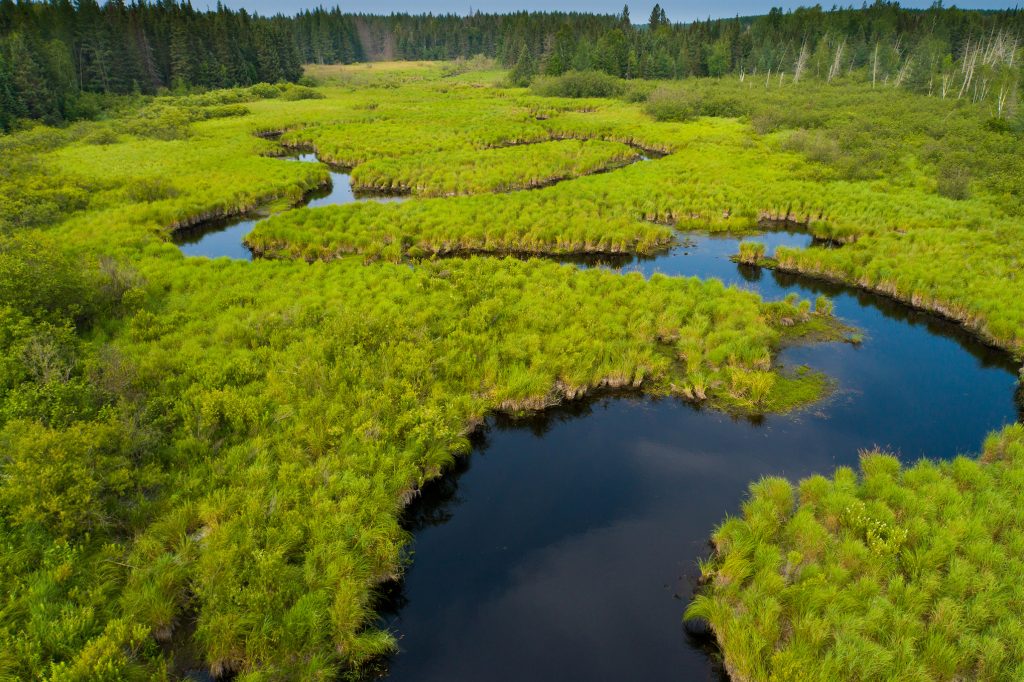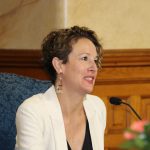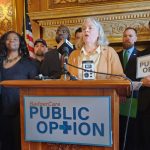Court Ruling In Its Favor Puts Wisconsin Conservation Program ‘On Life Support’
GOP lawmaker says court ruling that blocked pocket vetoes has reduced support for program.

The Conservation Fund purchased 70,000 acres of the Pelican River Forest in northern Wisconsin from the investment firm The Forestland Group. The purchase aims to set aside land for recreational use and logging for years to come. Jay Brittain/The Conservation Fund
Wisconsin’s decades-old land purchase program is “on life support,” a Republican supporter told environmental advocates Wednesday.
The Warren Knowles–Gaylord Nelson Stewardship program lets Wisconsin’s Department of Natural Resources borrow money to buy land and set it aside for conservation programs.
While there is still some bipartisan support for the program, a recent court battle left Republicans cautious of the process, said Rep. Tony Kurtz, R-Wonewoc.
“I’m going to be brutally honest this afternoon with you right now. Knowles-Nelson is truly on life support,” he said. “Some of my colleagues give it a 20 percent chance of getting done.”
Kurtz, who sits on the Legislature’s budget committee, was one of several lawmakers who spoke to advocates from Audubon Great Lakes, which supports environmental preservation and protecting birds and their habitats. They were in Madison to ask lawmakers to renew funding for the stewardship program, which is due to expire in June of 2026.
Gov. Tony Evers has called for a billion dollars in funding for the program over the next 10 years. At $100 million per year, that’s a sharp increase from the program’s current level of state support, which is $33 million per year.
Lawmakers from both parties have expressed support for many of the program’s goals, which sets aside land for recreation, habitat and species protection, and climate and flood resilience. Grants disbursed through the program can also go to things like expanding infrastructure and facilities in existing parks.
But the program was subject to a court battle that ended last year when the Wisconsin Supreme Court determined that lawmakers on the Joint Finance Committee, which writes state budgets and authorizes state funding, were improperly blocking stewardship projects.
Using a process sometimes referred to as a “pocket veto,” anonymous members on the GOP-led committee were able to raise objections to projects, thus effectively sending them into permanent limbo. Last July, the high court ruled that those vetoes were unconstitutional.
Kurtz said Wednesday that’s made some Republicans believe that the program lacks sufficient oversight. He encouraged the advocates not to lobby for the full amount of Evers’ budget request, saying it would cause some of his colleagues to “immediately stop listening.”
“I know you don’t like to hear that, but I’m being brutally honest,” he said, becoming briefly choked up. “I’m being very sincere. I’m trying to keep this alive.”
Wisconsin’s stewardship program has deep bipartisan roots, having been created in 1989 by former Republican Gov. Tommy Thompson with the help of a Democratic Legislature. It was renamed to honor Knowles and Nelson, two former Wisconsin governors who embraced conservation efforts, Knowles as a Republican and Nelson as a Democrat.
But the program has its critics. Some Republicans object to the funding mechanism for stewardship projects, which involves borrowing money, arguing that it requires the state to take on debt it can’t afford. Some Republican lawmakers from rural areas also complain that purchases remove land from the tax rolls, which makes it harder to fund local projects.
Sen. Jodi Habush Sinykin, D-Whitefish Bay, expressed hope that lawmakers could come to a compromise.
“It’s easier to maintain something, to keep it, rather than terminating a successful, popular program and then in the future, bringing it back,” she said. “Let’s keep what we have and continue to nurture and allow it to prosper, but not … give any ammunition to those folks who want to terminate it completely.”
The Audubon advocates’ work comes as bird populations nationwide have declined significantly, in part because of a decline in habitat lands. In Wisconsin, wetland and grassland disappearance has threatened some protected bird species.
Knowles-Nelson Stewardship projects have taken place in all of Wisconsin’s 72 counties.
As advocates call for conservation funding, Wisconsin’s stewardship program faces steep odds was originally published by Wisconsin Public Radio.
If you think stories like this are important, become a member of Urban Milwaukee and help support real, independent journalism. Plus you get some cool added benefits.





















